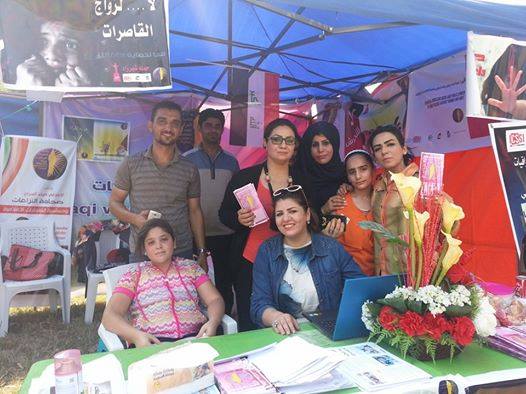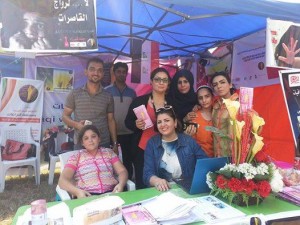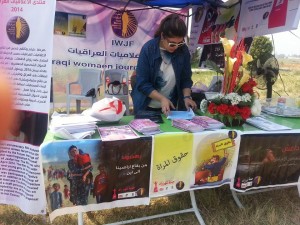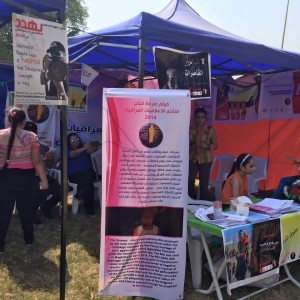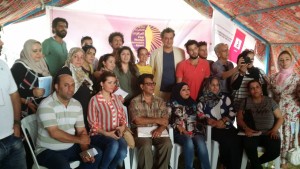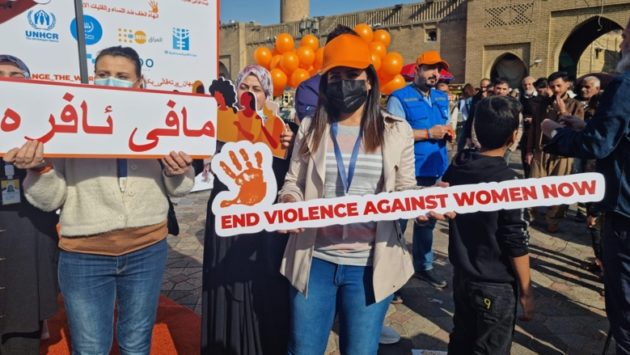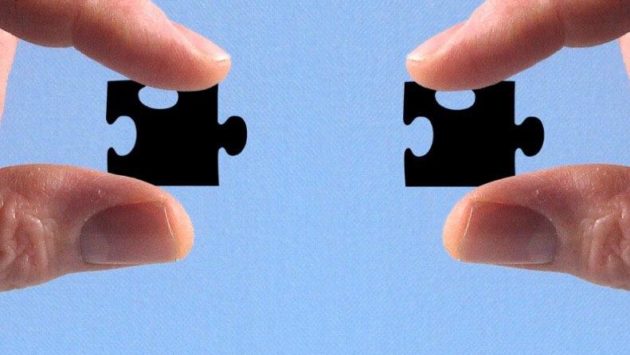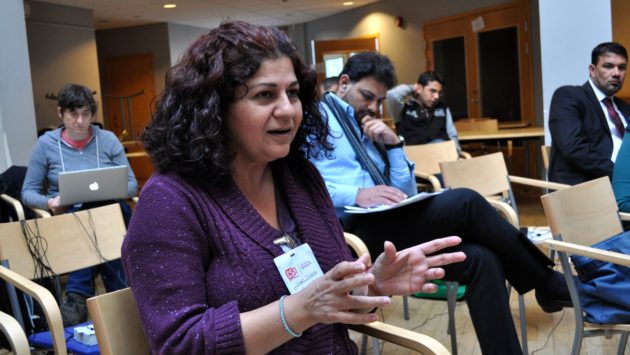Shahrazad Festival at the Second Session of the Iraqi Social Forum
Iraqi Women Journalists Forum (IWJF) – October 2015
In Abu Nawas gardens, near the Tigris River in the heart of the capital Baghdad and in the framework of the second session of the Iraqi Social Forum which was held for the period from October 2-3, the Iraqi Journalists Women Forum members have organized within the activities of Shahrazad campaign their own booth and program “ٍShahrazad Festival”. The festival has attracted dozens of Iraqi and international visitors, and the activities have been receiving a large and distinct interest.
The IWJF activities lasted over two days, and started by reviewing the forum activities over the last four years showing the most important stages of the struggle for their rights as journalists, and for the largest representation of women in media organizations, and for the Iraqi women’s rights in general.
The first day included a brief presenting to the film “Scream” produced by the Iraqi Women Journalists Forum in 2014, as part of the campaign to reject Aljaafari Personal Status draft law and underage marriage. The film “Narjis Diary” which was produced in 2015 within Shahrazad campaign was also screened. The film spoke about the reality of the Iraqi Azidi women, and the violations she suffered after Daesh control over Mousil city, by showing the story of a women journalist from inside Mosul.
A range of posters and folders was also disseminated in Arabic and English reflecting the activities of the Forum and Shahrazad campaign against harassment and underage marriage. The first day program also included offering food, drinks, as well as local music from the Iraqi heritage.
The first day program was concluded with a brief presentation of the book of the journalist Dhiaa Sarai, the director of UNESCO Baghdad office, the book that titled (Press disputes and the sensitivity of media coverage), focused on the risks that journalists face while working in conflict areas, with a lot of examples from different countries and examples from Iraq. The book also addresses the legal frameworks that are directly related to the protection of journalists. At the end of the show, a set of copies was distributed to the visitors of the IWJF booth.
Women in the Iraqi Drama and Cinema
The second day activities included the opening of art exhibition of Yazan Ahmed, one of the IWJF members, the exhibition addressed the issue of women from the eyes of the Baghdadi folklore, and the drawings dealt with the daily life of the Iraqi women. The presence and attention of the forum visitors continued during the second day, which also included conducting the Media Session No. 25, those sessions are gatherings that the IWJF is hosting on a regular basis, and each of which is allocated a specific topic to be debated.
The Media Session No. 25 was titled with “Women in the Iraqi drama and cinema” in which the Iraqi writer and scriptwriter Hamid Al-Maliki was hosted. The session which was facilitated by the head of the IWJF “Nibras Al-Maamouri” started with introduction on Shahrazad Campaign and its activities in Baghdad in cooperation and support of the Iraqi Civil Society Solidarity Initiative (ICSSI). Al-Maamouri pointed out the opposition of Shahrazad campaign to the phenomenon of harassment of women and girls, and for the activities organized by IWJF in this regard.
On the role of the media and drama, Al-Maamouri touched during her speech to the results of a questionnaire prepared by the forum on the image of women in the media, showed that 72% of the Iraqi media avoid addressing women’s sensitive issues in the material they produce. While 52% of the media productions shows the women as naive and backward, and limits her roles in the society on stereotypical roles “cleaning the house, caring of children, etc.). Al-Maamouri indicated that there is a great responsibility lies on the media and on the scriptwriters in the drafting of the Iraqi public awareness about the role of Iraqi women in our society.
For his part, the writer Hamid Al-Maliki reviewed his drama productions (such as: Aldahana, Sara Khatun, Abu Tobar, Phobia Baghdad and alsayida wal hob wal salam, etc.), and its contents for the image of Iraqi women, and pointed to the suffering of women from violence and the influence by the community, stressing that the Iraqi drama and cinema need a lot for the purpose of advancement of more than half of the society, adding that the customs, traditions and discrimination has effected even the number of women working in the field of art. Hamid concluded to the importance of supporting young people for the purpose of access to the real change that is desired by the Iraqi intellectuals and civilians.
Audience of the session participated by asking questions and observations and exchanged views and visions on this important topic, and there was intervention from “Alessia Piva” of the Italian organization “Un Ponte Per…” about Iraq cinema in which she wondered about the existence of Iraqi women in film directing, where it is obvious that women are more able to express their counterparts of women and girls sufferings in the community and through the dramas or film that deals with women in a positive and non-traditional way. The attendees agreed that there is a very modest presence of Iraqi women in the directing of films, this modest presence increase when women filmmakers deal with their counterparts in the traditional way that picture the women as a weak creature and marginalize her in the lives of men.
The Forum concluded the second day with continuous dialogues between the audience about the role of civil society in the Women’s Equity through the creation of a major change in the ways that the drama address women issues in media, as well as for the creation of alternative media that talk about the potential and creative energies in building societies that women have. The audience cited the presence of the IWJF and its insistence on the change by supporting women’s issues, and stressed on the need for the continuation in supporting the forum in order to change the traditional picture of the Iraqi women and guarantee the protection of women, in a way that allow them to increase their contribution to the building of a civil democratic society on the basis of equality.

